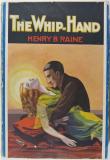AustLit
The material on this page is available to AustLit subscribers. If you are a subscriber or are from a subscribing organisation, please log in to gain full access. To explore options for subscribing to this unique teaching, research, and publishing resource for Australian culture and storytelling, please contact us or find out more.
Latest Issues
AbstractHistoryArchive Description
'This story gives a vivid portrayal of the spirit still animating the ex-members of the historical A.I.F. It is not a war story, but a well-written account of the adventures of a few hard-case ex-soldiers and their trials and troubles since their return from the great war. Reading it, one is impressed by the stark realism of the characters and with the natural course of the love interest which runs so charmingly thoughout the story. The underworld characters are true to life and in no wise overdrawn, while the human interest is maintained throughout.' Inside back cover of The Lash End (1933).
E. Morris Miller's Australian Literature From its Beginnings to 1935 (1940): 791 comments: 'In The Whip-Hand some down-and-out Anzacs make good use of a first prize lottery ticket and protect a girl against a gang of drug-runners.'
Notes
-
Dedication: To the Diggers who are still living and fighting the battle of life
-
Author's Foreword: 'An organization in Sydney that has received very little publicity, owing to the very thoroughness of its work, is the Drug Bureau attached to C.I.B. Headquarters. Having closely followed their unceasing efforts, I was inspired to write this book....The Digger characters depicted in this story are the counterpart of those splendid men with whom I fought in the historical A.I.F. Many of them are still fighting - but now against adversity - yet the stoical smile that won them fame and popularity in the grim days of war is as evident to-day as ever.' Henry B. Raine. Sydney, July 1933.
-
Author's note: The names of the characters mentioned in this story are purely imaginative, and do not refer to any living person. Bluey and Lofty and Co., represent the fine type of Diggers who left their farms, stations, factories, and offices, in Australia and New Zealand, to fight for the Empire in the Great War of 1914-18.
Publication Details of Only Known VersionEarliest 2 Known Versions of
Works about this Work
-
Short Reviews
1933
single work
review
— Appears in: The Australian Women's Weekly , 5 August vol. 1 no. 9 1933; (p. 39)
— Review of The Whip-Hand 1933 single work novel -
More Australian Publishing
1933
single work
column
— Appears in: All About Books , 12 September vol. 5 no. 9 1933; (p. 151) Grim praises N.S.W. Bookstall's efforts in promoting Australian literature and for also "catering for the market so abhorred by literary snobs". -
Untitled
1933
single work
review
— Appears in: The Bulletin , 9 August vol. 54 no. 2791 1933; (p. 5)
— Review of The Whip-Hand 1933 single work novel
-
Short Reviews
1933
single work
review
— Appears in: The Australian Women's Weekly , 5 August vol. 1 no. 9 1933; (p. 39)
— Review of The Whip-Hand 1933 single work novel -
Untitled
1933
single work
review
— Appears in: The Bulletin , 9 August vol. 54 no. 2791 1933; (p. 5)
— Review of The Whip-Hand 1933 single work novel -
More Australian Publishing
1933
single work
column
— Appears in: All About Books , 12 September vol. 5 no. 9 1933; (p. 151) Grim praises N.S.W. Bookstall's efforts in promoting Australian literature and for also "catering for the market so abhorred by literary snobs".
Last amended 18 Aug 2016 15:51:29
Export this record




